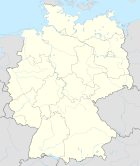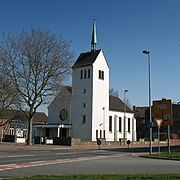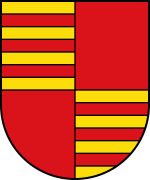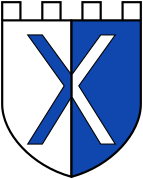Ahaus
| coat of arms | Germany map | |
|---|---|---|
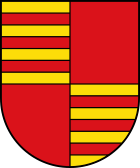
|
Coordinates: 52 ° 5 ' N , 7 ° 0' E |
|
| Basic data | ||
| State : | North Rhine-Westphalia | |
| Administrative region : | Muenster | |
| Circle : | Bark | |
| Height : | 50 m above sea level NHN | |
| Area : | 151.24 km 2 | |
| Residents: | 39,381 (Dec. 31, 2019) | |
| Population density : | 260 inhabitants per km 2 | |
| Postal code : | 48683 | |
| Primaries : | 02561, 02567 | |
| License plate : | BOR, AH, BOH | |
| Community key : | 05 5 54 004 | |
| LOCODE : | DE AHA | |
| City structure: | 6 districts | |
City administration address : |
Rathausplatz 1 48683 Ahaus |
|
| Website : | ||
| Mayoress : | Karola Voss (independent) | |
| Location of the city of Ahaus in the Borken district | ||
The town of Ahaus ( ) located in the western Münsterland in northwestern North Rhine-Westphalia and is a medium-sized district town of Borken in Münster Region .
geography
Geographical location
The west Munsterland city on the Ahauser Aa borders in the north-west of the city on the border with the Netherlands . The maximum north-south extension of the urban area is 18 kilometers, the maximum west-east extension 14 kilometers. The highest point is 70 meters above sea level , the lowest point is 36 meters above sea level.
City structure
The urban area is divided into the following localities (population figures as of December 31, 2012):
| Locality | Residents |
|---|---|
| Ahaus (with Ammeln ) | 18,251 |
| Alstätte | 4,969 |
| Graes | 1,662 |
| Ottenstein | 3.831 |
| What | 4,734 |
| Fluff | 5,560 |
| All in all | 39.007 |
Neighboring communities
Ahaus borders in the northeast on the city of Gronau , in the east on the municipalities of Heek and Legden , in the south on the city of Stadtlohn and in the west on the city of Vreden . All municipalities belong to the Borken district . To the northwest, Ahaus borders the Dutch municipality of Haaksbergen and the Dutch city of Enschede , both of which belong to the province of Overijssel .
| City of Enschede ( Overijssel / NL ) | City of Gronau ( Borken district ) |
Heek municipality ( Borken district ) |
| Haaksbergen municipality ( Overijssel / NL ) |
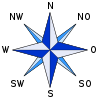
|
Legden municipality ( Borken district ) |
| City of Vreden ( Borken district ) |
City of Stadtlohn ( Borken district ) |
Land use
Around 80% of the urban area consists of forest and agricultural areas. The building and open spaces account for around 10%. The total other land use can be seen in the following table:
| Land use in 2013 | Area in hectares | Percentage ownership % |
|---|---|---|
| Buildings and open spaces | 1543 | 10.20 |
| Traffic areas | 868 | 5.74 |
| Operating areas | 82 | 0.54 |
| Forest areas | 2094 | 13.85 |
| Agricultural land | 10,050 | 66.45 |
| Bodies of water | 282 | 1.86 |
| Recreational areas and cemetery areas | 174 | 1.15 |
| Areas of other use | 31 | 0.20 |
| total area | 15,124 |
history
The first written mention of the aristocratic residence Haus an der Aa dates from around 1030. Around 1120, Bernhard von Diepenheim had Ahaus Castle built around where Ahaus Castle is today . In 1154 his son Lifhard first called himself by the name of Ahaus . The Lords of Ahaus belonged to the smaller noble families in Westphalia in the wider vicinity of the Münster bishops. They got into a dispute with them in 1176 when the nobleman Johann von Ahaus gave his castle to the Archbishop of Cologne as a fief . In 1177, however, Johann had to submit to Prince-Bishop Hermann II of Münster . The Ahaus and Diepenheim castles belonging to the noble lords of Ahaus were destroyed. Nevertheless, the noble lords initially remained in possession of their rule.
In 1389 the noblemen of Ahaus granted the castle settlement an excise privilege. Two years later, Ahaus received city rights . In 1406, the Prince-Bishop of Münster Otto IV von Hoya bought the Ahaus estate and incorporated it into the Münster bishopric . It was grouped together with 24 parishes, which stretched over large parts of the Westmünsterland, to the Amt Ahaus by the Duchy of Münster . It was in place until it was dissolved by the Reichsdeputationshauptschluss in 1803.
The visit of the Prince-Bishop of Münster Christoph Bernhard von Galen to Ahaus was dated October 4th 1650 . At his instigation, the first German faience manufacture was founded in Ahaus in 1653 , but closed again in 1657. In 1688, at the instigation of Prince-Bishop Friedrich Christian von Plettenberg, the old castle was demolished. The new building in the form of a baroque moated castle was carried out according to the plans of Ambrosius von Oelde and was completed in 1690. The entire complex with the associated garden area was not completed until 1718. The first modernization of the castle dates from 1763 to 1767 under the direction of Johann Conrad Schlaun . In the course of the modernization, the garden-side center risalit and the garden stairs were created.
In 1803, the rule and castle of Ahaus fell to the princes of Salm-Salm and Salm-Kyrburg ( Principality of Salm ) through the Reichsdeputationshauptschluss . After brief membership of France (1810 to 1813; during this time France had annexed the Principality of Salm), the city came under Prussian rule in 1815 .
In 1819 Hermann Oldenkott built a tobacco factory in Ahaus Castle. In 1829 the company acquired the baroque palace from Prince Salm-Kyrburg . It served as a production facility until 1929 and as a residence for the Oldenkott family until it was completely destroyed in World War II . In 1949 it was rebuilt by the district and town of Ahaus.
The city fire of October 13, 1863 almost completely destroyed the city.
In 1881 an ignition goods factory was founded. Two years later, the Westphalian jute spinning and weaving mill was founded. In 1886 the jute factory built its workers' settlement , the colony and what is now the city of Oldenburg. It originated in a part of that peasantry Ammeln . The name Oldenburg leads back to the old field name Ollenburg .
In 1980 the “Ahaus meeting point” opened in the center of Ahaus. This housed an ice rink, which was used by the ice hockey club ESC Ahaus as a training and venue. In the following years, the first team of the club became known nationwide due to their performance and played u. a. in the Ice Hockey NRW League , in the Ice Hockey Regionalliga West and in the Ice Hockey Oberliga Nord . In 1991, the ESC Ahaus dissolved after the operation of the ice rink in Ahaus had to be discontinued for financial reasons.
The city of Ahaus gained national recognition through the resistance of the citizens' initiative No atomic waste in Ahaus e. V. (BI Ahaus) and many other groups against the construction and operation of the controversial Ahaus transport cask storage facility and the associated transports of nuclear waste .
Incorporations
In the course of the municipal reorganization, the Wüllen office (consisting of the municipalities of Wüllen and Ammeln) was dissolved on July 1, 1969 and Wüllen and Ammeln were incorporated into the town of Ahaus. On January 1, 1975, triggered by the Münster / Hamm law , the municipalities of Alstätte, Ottenstein and Wessum (municipalities of the Wessum Office) were incorporated. The city lost the district seat to Borken .
Population development
The following table shows the development of the population in Ahaus since 1939: As of 1996 as of December 31st. one year
|
|
The decline in the population in 2011 is due to the redefinition of the population of Ahaus based on the EU-wide Census2011 census , a procedure in which it was determined how many people live in a city or municipality. The censorship date was May 9, 2011.
religion
The Catholic Church of St. Mary of the Assumption with the high bell tower is the dominant building on the market square in Ahaus. A church already stood here in the early days of Ahauser's history. In 1965 the old nave was demolished except for the late Gothic tower and the new church was built in its place according to a design by the architect Erwin Schiffer , Cologne. The view of the church building is dominated by grid-like concrete elements with colored glazing (design by Georg Meistermann ). Robert Gernhardt wrote the poem St. Horten in Ahaus about the new building , which refers to a superficial similarity between the architecture of the church and the grid facades of the contemporary new buildings of the department store company Horten AG .
The Christ Church on Wüllener Straße was built according to a design by the Berlin architect August Orth and was consecrated on September 17, 1879 as the first Protestant church in Ahaus. In March 1945 the church building was badly damaged by the effects of the war, after which it was largely redesigned in 1954. Among other things, the bell tower was renewed and a new round window was built into the west gable of the nave.
The Catholic Church of St. Josef was built in 1952 as a single-nave brick building with a straight choir closure. Inside is the old sandstone Way of the Cross, which originally belonged to the old, demolished Church of St. Mary of the Assumption.
The Ammelner Chapel is located on the eastern edge of the built-up area of the city. The small church was rebuilt in neo-Gothic style in 1881 after it burned down soon after it was first built in 1733.
The surviving Jewish cemetery is one of the last visible evidence of the Jewish community .
politics
City council
The city council of Ahaus has 42 elected members. The stipulated number for a city with a population between 30,001 and 50,000 is usually 44 councilors. By resolution of the city council, this number was reduced by two council members to 42. The council members are elected for a five-year term by local elections. Half of the council members are elected in constituencies, the other half by lists. The current term of office started in June 2014 and ends on October 31, 2020 due to transitional regulations .
The full-time mayor and chairwoman of the council Karola Voss (non-party) is also entitled to vote in the city council.
The last local elections in Ahaus produced the following results:
| City council of Ahaus: share of the vote and seats of the parties, directly-elected mayor | |||||||||||||||||
|---|---|---|---|---|---|---|---|---|---|---|---|---|---|---|---|---|---|
| choice | WGW | Total | mayor | Political party | |||||||||||||
| XII .: 1994 | 51.1% | 22nd | 26.3% | 11 | 8th | 1.9% | 0 | - | - | 41 | |||||||
| XIII .: 1999 | 58.5% | 25th | 18.9% | 8th | 8th | 1.2% | 0 | 2.0% | 1 | - | 42 | Dirk Korte | CDU | ||||
| XIV .: 2004 | 55.8% | 23 | 15.8% | 7th | 15.2% | 6th | 5.0% | 2 | 4.5% | 2 | 3.7% | 2 | - | 42 | Felix Büter | CDU | |
| XV .: 2009 | 49.7% | 21st | 15.6% | 7th | 15.2% | 6th | 8.0% | 3 | 4.8% | 2 | 4.6% | 2 | 2.0% | 1 | 42 | Felix Büter | CDU |
| XV .: 2014 | 47.2% | 20th | 20.7% | 9 | 17.3% | 7th | 3.7% | 2 | 5.2% | 2 | 6.0% | 2 | - | 42 | Felix Büter | CDU | |
| Sources: The Regional Returning Officer , Information and Technology (PDF; 71 kB), ea - Strongest parliamentary group highlighted in color. | |||||||||||||||||
mayor
The full-time mayor is the highest representative of the city of Ahaus, chairman of the council and head of administration.
Chronicle of the mayors since the municipal reorganization in 1975:
honorary mayor:
- Josef Ikemann , CDU , 1964–1989
- Leopold Bussmann, CDU , 1989–1998
full-time mayor
- Dirk Korte, CDU , 1998-2004
- Felix Büter , CDU , 2004–2015
- Karola Voss , independent , in the mayoral election on September 27, 2015, she was elected in a runoff election with 67.55% of the vote. Your opponent, Christoph Almering, received 32.4%. The turnout was 53.1%. She took office on October 21, 2015.
Coat of arms and banner
With the approval of the District President of Münster on April 14, 1978, the city has a coat of arms, a flag and an official seal.
Coat of arms of the former municipality of Alstätte
Coat of arms of the village of Graes
Coat of arms of the former municipality of Ottenstein
Coat of arms of the former municipality of Wessum
Coat of arms of the former municipality of Wüllen
coat of arms
Blazon : "The coat of arms of the city of Ahaus is squared of gold (yellow) and red, fields 1 and 4 are each covered with three continuous red bars"
The coat of arms and the coat of arms colors are borrowed from the former sovereigns, the noblemen of Ahaus, whose Ahaus castle the city of Ahaus owes its creation to. It is based on a seal from the 14th century.
banner
Description of the banner: "The flag (banner) is striped lengthways from red and yellow in a ratio of 1: 1."
Town twinning
A partnership with the neighboring Dutch municipality of Haaksbergen has existed since 1988 . In 2013, the 25th anniversary of this very intensive city partnership was celebrated all year round with numerous events. A friendship between the district of Wüllen and the French community of Argentré-du-Plessis ( Ille-et-Vilaine , Bretagne ) began in 1972 and became an official partnership in 1976. Since 1999 there has also been a partnership between the Graes district and Umhausen in Tyrol (Austria). There are still friendly contacts to the cities of Domodedowo in Russia, Vilkaviškis in Lithuania and Buldan in Turkey.
Culture and sights
Museums
Since 2002, the gatehouse of the home castle Ahaus the Torhaus- and school museum Ahaus . This school museum shows school utensils from the 19th and 20th centuries.
Euregio art route
Ahaus is a stop on the Euregio Art Route, founded in 1991 , which runs across borders for around 60 kilometers through the region and the Dutch towns of Diepenheim and Haaksbergen and the German towns of Ahaus and Schöppingen . The following works of art can be seen in Ahaus:
- “Approach” by Piotr Sonnewend : This five-part sculpture with a total length of 13 meters is set up on a lawn between the town hall and the Protestant church. Granite and copper are the contrasting materials, two of which each approach the high central sculpture. The sculpture is a symbolic representation of people approaching from both sides of a border.
- “Brunnen (Fontein)” by Bonifatius Stirnberg : In contrast to the mostly abstract works of art on the art route, the design by the Aachen artist remains in figurative, objective representations. Farmer's wife, wooden shoemaker and other craft trades, but also the Ahauser Wasserfräulein, with their flexible limbs, particularly appeal to children to make contact with the figures shown.
Attractions
The baroque moated castle Ahaus is located directly in the city center of Ahaus. The former residential palace of the Prince-Bishops of Münster was built in 1690 as a hunting lodge on the initiative of Prince-Bishop Friedrich Christian von Plettenberg according to the plans of Ambrosius von Oelde in place of an old castle. The construction work for the castle and the surrounding castle park was not completed until 1718 . During the Second World War , the castle was destroyed by an air raid in March 1945. After the war, the Ahaus district acquired the ruins and rebuilt the castle. Today the Ahaus Technical Academy as well as the gatehouse and school museum are housed in the castle.
The Villa van Delden in Bahnhofstrasse is a listed town house from the 19th century. The builder Jan van Delden was the owner of the jute spinning and weaving mill van Delden and had the neo-classical, white plastered two-storey villa built between 1890 and 1892. The villa has been owned by the city of Ahaus since 1989. Today it serves as a meeting place and venue for art exhibitions.
Directly at the St. Mary's Assumption Church in the city center of Ahaus is the 30 meter long fountain sculpture “Sources - Flowing - Sinking - Drinking” by Kalkmann Kontakt-Kunst, which the two sculptors carried out on site as part of a 2006 contact-art campaign Hans-Werner Kalkmann and Jens Kalkmann was created. Five black sienite steles donate water from spring pots, which runs off onto surfaces of different lengths made of red granite. The stele facing the market square gives the thirsty cyclist and everyone else refreshing drinking water when a sensor button is pressed. In the dark, the steles are illuminated by a fiber optic light guide system.
Buildings
See also: List of architectural monuments in Ahaus
Nature reserves
Eleven nature reserves with an area of around 1355 hectares are designated in the urban area. Four of these areas are only partly in the urban area of Ahaus. A communal delimitation of the areas is therefore not possible.
societies
One of the most important clubs is the more than 400 year old Bürger- und Junggesellenschützenverein e. V. 1584/1606, the municipal chapel Ahaus 1883 e. V., the Spielmannszug Ahaus 1896 e. V. as well as the 100-year-old Schützenverein Feldmark 05. Ahaus is the seat of the art association ArtHAUS eV, which was founded in 1998 by citizens interested in art and has since organized exhibitions of contemporary art. The Musikerinitiative Ahaus eV association has existed since 1991 to promote youth and culture, with a rich cultural offer and space for young musicians to develop.
Regular events
In addition to the Ahaus Palace Concerts, which have been held since 1952 and are organized by the Borken district and the city of Ahaus, concerts by leading performers, primarily chamber music , take place throughout the year in the prince's hall, which was renovated in 1996.
Other regular events are:
- April: Ahaus industrial days
- May: Ahaus City Festival
- August: Traditional Graes market on Hefflers Kotten
- August: Grünewald live - the Ahauser pub festival
- September: Ahauser fair
- December: Alstätter Advent market around the church in Alstätte, StattAlm hosted by Tobit.Software
Sports
VfL Ahaus
The VfL Ahaus 1892 e. V. combines the following sports under one roof: basketball , handball , running, athletics , cycling , swimming , dancing , tennis , table tennis , gymnastics and volleyball . Of course, that is sports badges removed and there is the possibility weight training to operate. In addition, further sports courses in the area of "Fitness & Health" are held for members and non-members.
Soccer
Football is very popular in the Münsterland region, including in Ahaus. There is at least one football club in each of the six districts, and there are even three in Ahaus-Stadt. The top-class club of the men is the SV Eintracht Ahaus , whose first men’s team is currently playing in the seventh-class national soccer league season 4 of the Westphalia soccer and athletics association .
The other clubs are:
- 1. FC Oldenburg Ahaus
- TSV Ahaus (Turkish Sports Club)
- VfB Alstätte
- Sports fans Graes
- FC Ottenstein
- SV Union Wessum
- TuS Wüllen
The SV Union Wessum provides the highest-class women's team that plays in the regional league season 3.
Inline skater hockey
In 1996, an inline skater hockey club was founded under the name “Ahauser Skate Club” and is a member of Inline Skaterhockey Germany (ISHD). Since 2008, the club has only appeared externally under the name Ahauser Maidy Dogs. The Maidy Dogs have had a play area at a leisure area in Ahaus-Unterortwick since they were founded. In 2002 the uncovered play area was replaced by a hall. In August 2012, the hockey hall was badly damaged by arson, but leagues could continue to operate.
DLRG Ahaus
The DLRG local group Ahaus has more than 2,300 members of one of the largest sports clubs in the metropolitan area and the largest DLRG division in Germany.
golf
In 1988, the era of golf began in Ahaus with the opening of a driving range with four practice holes. The golf course in the Alstätte district has been expanded to 27 holes through several extensions. The facility is run by the Golf- und Landclub e. V. Ahaus used.
Other clubs and sports facilities
In Ahaus and the districts, sport is also practiced in several tennis, martial arts, equestrian sports and various other clubs.
The city of Ahaus has two baths. In the course of the closure of the indoor pool in the center of Ahaus, the former wave pool was converted into the "AquAHAUS", a combined pool with wave pool, through renovation or expansion by 2009. There is also an outdoor swimming pool in the Alstätte district.
Economy and Infrastructure
Established businesses
The city has a medium-sized economic structure with many industries. The utility company Stadtwerke Ahaus was founded in 1915. In addition to the software provider Tobit Software, the door manufacturer Herholz and the fuel element interim storage facility , it is also the location of several medium-sized companies. In 2014, the State Office for Information and Technology in North Rhine-Westphalia collected the following data on the employment structure:
- Manufacturing 7,271 (41.19%)
- Other services 6,742 (38.2%)
- Retail, hospitality and transport 3,484 (19.74%)
- Agriculture, forestry, fisheries 154 (0.87%)
media
Ahaus belongs to the circulation area of the weekday newspapers Westfälische Nachrichten and Münsterland Zeitung . The newspapers Wochenpost on Wednesday and Wochenpost on Sunday distribute local news from the region and appear on a weekly basis on Wednesdays and Sundays.
The city magazine are the Ahauser Blickpunkte . The magazine is published by Ahaus Marketing & Touristik GmbH and appears every two months with a circulation of around 15,000.
The Ahauser is an online news portal in Ahaus. The communication agency Intradus GmbH from Ahaus operates the website and app.
education
In Ahaus, around 14,000 students go to the schools mentioned below every day. Ahaus is thus an important school center in the region. The following educational institutions are located in the city:
- eight primary schools (one of which is a Montessori school , sponsored by: Helene-Helming-Schule, Ahaus)
- a secondary school
- a secondary school
- a comprehensive school
- two grammar schools (one of which is an Episcopal Gymnasium, sponsored by: Episcopal General Vicariate, Münster)
- two special schools
- Vocational college for economics and administration in Ahaus including a business school
- Vocational college for technology
- Vocational college Lise Meitner with upper school level
- Vocational college Canisiusstift with upper school level (sponsored by: Sisters of St. Maria Magdalena Postel )
- Westmünsterland vocational training center and Ahaus technical academy
- Study location of the Westphalian University of Applied Sciences Gelsenkirchen Bocholt Recklinghausen
traffic
Road traffic
Ahaus is connected to the motorway network via the A 31 (junction 32 Legden / Ahaus and junction 33 Ahaus-Nord / Heek). For many decades the federal highways 70 and 474 led through Ahaus, until January 1, 2010, their routes were changed.
Bicycle traffic
Ahaus is connected to the 100-Schlösser-Route and Flamingoroute cycle routes.
Rail transport
Ahaus is on the Westmünsterlandbahn , which was operated every hour from 2004 to 2011 by Prignitzer Eisenbahn GmbH . In December 2011, the traffic on the route was taken over by the DB Regio NRW with the same service .
Bus transport
Ahaus is served by a city bus line and several regional bus lines from Regionalverkehr Münsterland GmbH and regional lines from Westfalenbus GmbH. For cyclists there is the so-called Fietsenbus from May to October, which allows bicycles to be taken with a trailer in the Münsterland .
Air traffic
The nearest airports are in Greven ( Münster / Osnabrück airport , around 60 km) and in Enschede in the Netherlands ( Twente airport , around 25 km). Furthermore, the Stadtlohn-Vreden airfield is in the vicinity (approx. 21 km).
Personalities
literature
- Klaus Ludwig Voss: The prehistory and early history of the Ahaus district . Aschendorff, Münster 1967
- Wilhelm Kohl: History of the city of Ahaus. An overview . City of Ahaus, Ahaus 1980
- Burkhard Schwering: Neighborhoods and clubs in Ahaus. Studies on the culture and importance of organized groups . 1979 ( full text as PDF )
Web links
- City of Ahaus
- Law on the reorganization of municipalities in the Ahaus v. June 24, 1969 in full
- Link catalog on the topic of Ahaus at curlie.org (formerly DMOZ )
- Ahaus in the Westphalia Culture Atlas
- Municipal profile of the city of Ahaus
Individual evidence
- ↑ Population of the municipalities of North Rhine-Westphalia on December 31, 2019 - update of the population based on the census of May 9, 2011. State Office for Information and Technology North Rhine-Westphalia (IT.NRW), accessed on June 17, 2020 . ( Help on this )
- ↑ City of Ahaus: Population figures of the individual city districts ( Memento from October 4, 2013 in the Internet Archive )
- ↑ a b Geographical location and land use ( memento from April 20, 2015 in the Internet Archive ), accessed on April 12, 2015
- ↑ a b c d e f g Chronological overview of the history of the city of Ahaus ( memento from January 19, 2016 in the Internet Archive ), accessed on April 11, 2015
- ^ Westphalian history: Submission of nobleman Johann von Ahaus , accessed on April 11, 2015
- ↑ welt.de - Protests against Ahaus , accessed on April 10, 2015
- ^ Action alliance Münsterland against nuclear facilities ( memento from June 26, 2015 in the Internet Archive ), accessed on April 10, 2015
- ↑ Law on the reorganization of municipalities in the Ahaus district of June 24, 1969
- ^ Federal Statistical Office (ed.): Historical municipality directory for the Federal Republic of Germany. Name, border and key number changes in municipalities, counties and administrative districts from May 27, 1970 to December 31, 1982 . W. Kohlhammer, Stuttgart / Mainz 1983, ISBN 3-17-003263-1 , p. 311 .
- ↑ stadt-ahaus.de - Development of the population ( memento from June 28, 2020 in the Internet Archive ), accessed on August 8, 2020
- ↑ Nathanja Hüttemeister : Jewish Cemetery Ahaus. Salomon Ludwig Steinheim Institute , Duisburg 2010, ISBN 978-3-9807566-6-2 .
- ↑ North Rhine-Westphalia Local Election Act (KWahlG) of June 30, 1998, Section 3 - Number of representatives , accessed on April 8, 2015.
- ↑ Statute to reduce the number of representatives to be elected to the City Council of Ahaus , accessed on April 8, 2015
- ^ Ahaus mayoral election: A little crazy , accessed on October 12, 2015
- ↑ Coat of arms of the city of Ahaus. (No longer available online.) Archived from the original on May 10, 2013 ; Retrieved February 11, 2013 .
- ↑ Main statutes of the city of Ahaus, § 2. (PDF; 3.5 MB) Retrieved on February 11, 2013 .
- ↑ ahaus.de - twinning ( Memento of 19 April 2015, Internet Archive ), accessed on April 8, 2015
- ↑ ahaus.de - School Museum Ahaus ( Memento of 19 February 2015, Internet Archive ), accessed on April 8, 2015
- ↑ ahaus.de - Euregio Art Route ( Memento from May 27, 2015 in the Internet Archive ), accessed on April 8, 2015
- ↑ a b ahaus.de - Euregio Art Route: Ahaus ( Memento from April 19, 2015 in the Internet Archive ), accessed on April 8, 2015
- ↑ ahaus.de - Former residence of the Prince-Bishops of Münster ( memento from April 19, 2015 in the Internet Archive ), accessed on April 8, 2015
- ↑ ahaus.de - Villa van Delden ( Memento from December 29, 2011 in the Internet Archive ), accessed on April 10, 2015
- ↑ ahaus.de - Past exhibitions at Villa van Delden since 1997 ( Memento of 19 April 2015, Internet Archive ), accessed on April 10, 2015
- ↑ ahaus.de - Attractions Ahaus ( Memento of 19 April 2015, Internet Archive ), accessed on April 8, 2015
- ↑ Kunstverein eV style house in western Münsterland since 1998 , accessed on May 1, 2015
- ↑ ahaus.de - Events ( Memento of 9 May 2015, Internet Archive ), accessed on April 12, 2015
- ^ Homepage of the ASV
- ^ Article in the Münsterland newspaper
- ^ Homepage of the Maidy Dogs
- ↑ Homepage of the DLRG Ahaus
- ↑ Clubs and associations on the homepage of the city of Ahaus ( Memento from February 25, 2013 in the Internet Archive )
- ↑ Homepage of the AquAHAUS
- ↑ Employees in the economic sectors ( Memento from October 14, 2016 in the Internet Archive ) (as of June 30, 2014). ahaus.de. Retrieved October 14, 2016.
- ↑ Ahauser Blickpunkte - Imprint , accessed on April 12, 2015
- ↑ ahaus.de - Education ( Memento of 20 April 2015, Internet Archive ), accessed on April 12, 2015
- ^ Münsterland eV: Cycling in Ahaus | Münsterland eV Tourism. Retrieved June 3, 2017 .
